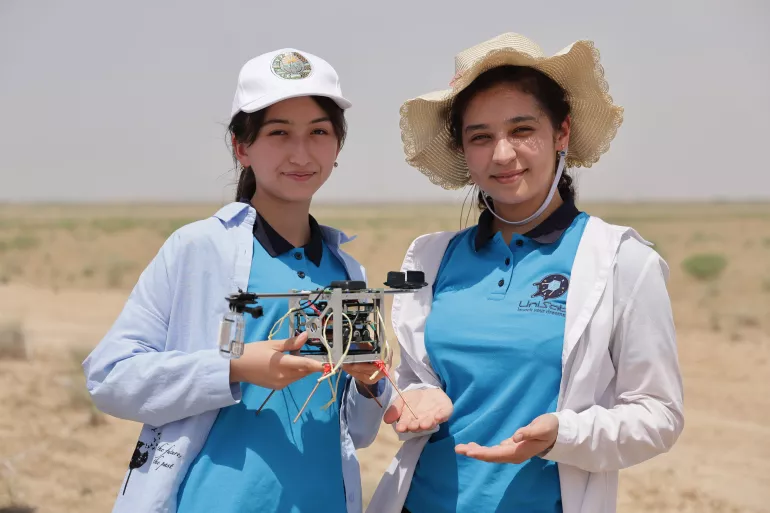Uzbek girls launched their nanosatellite into the stratosphere

On 8 May 2022, 20 girls from different regions of Uzbekistan, participants of the UniSat (Uni stands for UNICEF, Sat stands for satellite) educational program, launched their ultra-modern nanosatellite into the stratosphere in Navoiy region. With support of the specialists from UzHydromet, the girls will analyze the meteorological data collected.
The Navoi region was chosen as a launch site due to the suitable terrain, a large number of innovative and technological projects. The launch took place under the supervision of specialists from the air navigation services, because according to the instructions, it is necessary to “close” the sky for aircraft over the launch site. The nanosatellite was in the stratosphere for about 2 hours and rose to a height of 11,6 km.
Prior to the launch, 188 Uzbek girls aged 15-26 years old completed an online 4-month course on coding, engineering and data analysis. Top 20 girls selected, took part in a 10-day hands-on workshop on building, launching the nanosatellite and analyzing the data obtained in Almaty, Kazakhstan jointly with their peers from Kyrgyzstan and Kazakhstan.
UNICEF is partnering with Tech4Impact NGO and the Ministry of Innovative Development of the Republic of Uzbekistan to implement the UniSat international educational program for girls who are interested in science, technology, engineering and mathematics (STEM).
“Using innovation and technology is critical for empowering young people in UNICEF. Facilitating girls in STEM is also essential for girls to recognize they can participate in any field. Today is a huge milestone in that the 20 girls took part in scientific development with their skills and took a step forward to building a society free of gender stereotypes,” said Munir Mammadzade, UNICEF Representative in Uzbekistan.
“The launch of the nanosatellite and the subsequent analysis of the data obtained is an important step for our girls,” said Shahlo Turdikulova, Deputy Minister of Innovative Development. “The career opportunities in science, technology and data analytics are endless, and we invite the girls of Uzbekistan to choose STEM careers for themselves, conduct scientific research and experiments, and not be afraid to set ambitious goals.”
Every girl has the right to learn and gain skills, including STEM. Facilitating girls in STEM is essential for girls to recognize they can participate in any field regardless of gender.
UNICEF with its partners stands with all girls to provide opportunity and access to digital empowerment towards their future dreams.
“UniSat is more than just a project. It is knowledge. It is people. It is motivation,” said Diyora Daminova (17 y.o.)
Official website of the program: www.unisat.uz
Media contacts
About UNICEF
UNICEF works in some of the world’s toughest places, to reach the world’s most disadvantaged children. Across 190 countries and territories, we work for every child, everywhere, to build a better world for everyone.
For more information about UNICEF and its work for children visit www.unicef.uz.
Follow UNICEF on Twitter | Facebook | Instagram



